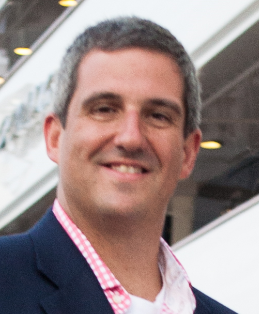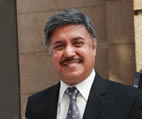Auto logout in seconds.
Continue LogoutThis interview with Michael Tarwater, CEO of Carolinas HealthCare System, was conducted by Eric Larsen, managing partner, and condensed by Dan Diamond, executive editor.
Question: Many CEOs that we've spoken with for this series said they moved around to help build their careers, and in some cases even served as the CEO for several different organizations. One reason I think your perspective is unique is that that you've been here for 30 years.
Michael Tarwater: Thirty‐three years, as of 2014.
Q: And you've been CEO since 2002. Take me through a bit of your background and how you navigated to Carolinas.
Tarwater: I was headed towards medical school, maybe to become a specialist, but as a rising junior in college I started counting up the number of years that it would take. And that got me thinking, "Gosh, it's going to be that long before I get my first job? I don't think I can do that."
Meanwhile, a good friend's dad was the chief executive of Baptist Hospital in Pensacola, Florida—a man named Pat Groner. So I would occasionally get to talk to Pat. And the more I learned about his job, the more I wanted to know. Pat suggested that I go through a program called cooperative education—I'd get to go to school for a quarter and work for a quarter. He sponsored me and I spent the quarter working at Baptist, primarily in personnel, purchasing and administration. I really enjoyed it and after the first quarter, I shifted all my courses to evening classes and basically worked full-time for the last two years of school.
Q: I see that you then went back to school, though.
Tarwater: That's right. I worked for a year before applying to graduate school. In Pat's mind—and I think he was absolutely correct—Master's level preparation was required to do what I wanted to do. After graduate school, I did a residency at UAB and stayed there for four-and-a-half years. I eventually became an assistant administrator, what we would call a VP today. Then I came to Carolinas HealthCare System.
Q: It's clear that Pat, and probably other mentors, played a key role in shaping your career. And now it's your turn to get inundated with requests, formally and informally, for mentorship and guidance. How do you think about that—cultivating the next generation of leaders, and especially ones that you personally are guiding?
Tarwater: I have a responsibility to answer any questions that I get asked. Even if I don't always have the time for a long meeting in the office, I try to make sure we talk on the phone, or that I connect them with someone else. I make sure that somebody talks to them and shares their perspective. People did that for me. Had they not, I don't know if I would be sitting here today.
The importance of cultivating that next generation of leadership is particularly important because of the industry that we are in. Health care is one of the most important, most complex industries, and also one that makes a big difference in people's lives. Part of the responsibility that comes along with the privilege of working in this field is to help nurture those who will guide its future.
System strategy
Q: Let's talk a little bit about the system, and Carolinas' evolution over the time you've been here, going all the way back to 1981.
Tarwater: From a 30-year vantage point, this was a turnaround. Back in the early 1980s, this was the number three hospital in a three-player market. I don't mean this disparagingly, but it was quickly headed towards being Charlotte's charity hospital.
Q: Obviously, that didn't end up happening. So what changed?
Tarwater: For the first decade or so that I was here, the goal was to get out of the ditch and get it headed in a different direction. We were early on a few things.
For instance, Charlotte was growing and the population was spreading to the greater geographical region, so we added a satellite hospital in 1985. Later that decade, a small group of physicians came to us and said, "We need help. We just want to practice medicine. Can you help us manage the rest of it?"
So we merged them in. That began a journey that's brought us to today, where we have about 2,500 employed physicians. And around that time, we started down the road to make sure that physicians and institutions were aligned on how health care was delivered. As we tried to execute our mission, it became clear there were so many places where incentives were not aligned. Taking care of everybody, regardless of their ability to pay, for instance.
Q: All of which is important, but also can be financially difficult to do.
Tarwater: That's right. And as we tried to position ourselves to have the financial wherewithal to continue those things, we had to figure out, how do we get more efficient? How do we take some of the waste out? How do we fund this mission? The way to do it was to be more efficient, to be more competitive. We weren't sitting here with any intent necessarily to grow. But in the late 1980s, early 1990s, people started to see the turnaround that we had, and asked us, "Hey, can you help us, too?" Especially because some of the smaller nonprofit hospitals in the region were beginning to struggle with prospective payment, HMOs, the Balanced Budget Act.
Q: It sounds like that's when Carolinas HealthCare System really began to come together.
Tarwater: The attitude on our part is we're not going anyplace we're not wanted. There won't be any hostile takeover. But if somebody wants our help, we are prepared and ready to help. That's how we built the system.
As folks approached us, the most important part of any arrangement to us was compatibility with our mission and values. So, the organization began to grow. And as it grew, we learned that the things that we had to put in place in order for us to be successful were scalable. We could share those things with the people who were asking us to join the family, so to speak.
We didn't have to do it through an ownership mechanism. The tool we used was a "management services agreement." And that had an appeal to some leaders. They didn't want to give up their hospital, but they needed help. And here we are today with 40 hospitals across two states and a little sliver in Georgia because that's the way we chose to do it, not with the objective to be bigger, ever.
Reforming care delivery
Q: You've described how Carolinas HealthCare System was built. I want you to now look forward—to talk about how health care systems need to evolve in the years to come.
Tarwater: We've got to change the way we deliver health care. As patients' needs change, we have to change. Our vision is to be a leader in transforming the way we deliver care and to be chosen for the value we provide our consumers.
Q: Walk me through one way you're doing that.
Tarwater: Behavioral health, to start.
As a state, North Carolina lags behind the national average in terms of available behavioral health services. In our home county, we were a little bit better because we had a 66-bed inpatient psych unit with a dedicated psychiatric emergency department and a fair-sized outpatient [unit]. But it wasn't enough. Every study that we did said it wasn't enough. As the state continued to close beds at their large state facilities, and as other providers continued to exit the business by closing beds or closing services, the need for behavioral health care didn't go away. It just went to a different place—acute care emergency rooms. Patients backed up, no place to put them.
Q: This is an issue that's plaguing hospital leaders across the nation. And different organizations have tried different approaches. Building more capacity, for instance.
Tarwater: We built an additional 66 beds in a different geography within the county rather than adding on. But that's not where we started.
Instead, we backed up to the beginning, looked at the problem, and looked at the tools we had available to us. As you know, there is a national shortage of psychiatrists and other behavioral health providers, so just adding staff wasn't a viable option—and if there were enough providers, just hiring more people isn't the be-all, end-all solution. We decided to use virtual technology and integrate behavioral health services into our large primary care base. Some studies will tell you that in upwards of 70% of primary care visits, there is an underlying behavioral health issue. Does that mean that the person is schizophrenic or has some really serious underlying issue? Maybe, maybe not. But we also know that, just like with a lot of other diseases, anything you catch early, you've got a lot better chance of successfully treating it.
Q: One problem that physicians say is that they need to speed patients through to get them seen.
Tarwater: Exactly. If you take that out to the rural communities, where there's a shortage of primary care, those doctors are already hugely busy. So we asked ourselves, what if we can screen out some of these issues early or in a different way? What if we can use our primary care infrastructure to help with behavioral health—and use our behavioral health resources to help primary care?
A natural synergy began to evolve and both providers are excited about the difference it will make for our patients. What we're doing is virtually embedding a centrally staffed behavioral health team in each of our primary care practices. If you do that on the front end, and you catch some of these behavioral health issues early, the improvement rate is unbelievable. The statistics blew me away. That's how we're approaching behavioral health. Did we build a hospital? Yes. Did it cost $36 million? Yes. Is that the most important investment we've made to transform the way behavioral health care is delivered? No.
Q: Your strategy of proactive, pre-emptive diagnosis seems unique. It also seems like it needs to get more attention.
Tarwater: I've been in this field for 40 years. I heard statistics four years ago about behavioral health that shocked me. And if I didn't know, inside the industry, what chance would the public have of knowing? Unless you have somebody in your family who is suffering from one of these issues, you don't know. And if you are that person, you feel hopeless. We're trying to give people hope.
The interesting thing is if you think about our vision, which is to transform the delivery of health care, it's truly aligned. People can debate the ACA or payment reform or insurance reform. But if we don't transform the way we deliver the care, we're headed off a cliff. But today, we also don't get paid for most of that transformation work.
Seeking balance
Q: You alluded to this earlier, but what would you tell someone who comes to you for advice? What guidance would you give a young executive?
Tarwater: One of the lessons that's most important is to start out balanced. That's tough at the beginning of your career. Of course, I notice when somebody does the best job they can do—I mean really works hard at something, and then has an interest in it, asks for more, asks to stay involved. The advice I give to young people is do whatever you're given to do because whether you think it's important or not, somebody thought it was important enough to ask for it. Do it to the best of your ability and ask for more. But at the same time, I tell them to balance their family, balance personal time with work.
Q: That's an important message, but not always an easy one to follow through on.
Tarwater: Our culture feeds this—the feeling that if I don't work 16 hours a day, and if I'm not here before the boss gets here and if I'm not here after the boss leaves, then people might notice that. It's [incredibly] hard to break that habit and to form balance. But it's really important to try and form it early. The generation that's coming along now is more in tune with that than my generation was. There's a cost to not having that balance. When I spend time with my grandkids now, I come back to work charged up. But if I didn't get to see them because I decided to work instead, I'd probably be sitting here thinking about missing out on time with family.
Q: When did you hit the equilibrium? When in your career did you start living what you just described?
Tarwater: I've been at this for about 40 years. It probably took me about half that time to get it. You know, a very wise man once told me that if a CEO wasn't spending 20% of their time just thinking, then they are probably missing something.
Q: I think there's wisdom in that, that a CEO should be contemplative 20% of his or her time. This industry is moving too fast and there's too much uncertainty to navigate course, otherwise.
Tarwater: I don't always hit that mark, but that's my goal. If I didn't strive for that goal, I wouldn’t be here today doing what I love to do, which is working to provide the best care possible for all of the communities we serve.
Get more lessons from the C-suite
See the Daily Briefing's archive of must-read interviews with other top hospital and health system leaders, including:
 Did this hedge fund leader invest in your hospital? Here's how he decides.
Did this hedge fund leader invest in your hospital? Here's how he decides.
Glenview Capital Management is Tenet's single largest shareholder and a major investor across the hospital industry. In an interview with the Daily Briefing, CEO Larry Robbins explains how he views the industry.
Why Sutter Health partners with other providers: 'We're not a believer that we have to do it all.'
In an interview with the Daily Briefing, CEO Patrick Fry discusses Sutter Health's expansion strategy, his approach to population health management, and the doctor that inspired him into medicine.
How two CEOs found a 'third way' and created one super-system
Before Baylor and Scott & White merged, there was "the Baylor way" and "the Scott & White way." Now, there's a "third way." The super-system's top two leaders explain in part two of a two-part interview with the Daily Briefing.Read our interview with Joel and Bob.
 Was it ‘absolutely nuts’ to take a 90% pay cut? A CEO reflects.
Was it ‘absolutely nuts’ to take a 90% pay cut? A CEO reflects.
In an interview with the Daily Briefing, Ram Raju—the CEO of the New York City Health and Hospitals Corporation—explains why he has spent the last 12 years working to improve public health systems. Read our interview with Ram.
 How an ACO champion—now a health system CEO—plans to put one in every market
How an ACO champion—now a health system CEO—plans to put one in every market
Richard Gilfillan explains how he viewed health care delivery as the first head of the Center for Medicare and Medicaid Innovation—and how that changed when he became the CEO of Trinity Health. Read our interview with Richard.
How an English major became a hospital CEO at age 29
In a Q&A with the Daily Briefing, Sandra Bruce explains what she's learned in her decades as a hospital CEO, how two systems overcome bumps in the road to become Presence Health, and what it means to "Lean In" in health care. Read our interview with Sandra.
Most staff aren't naturally great leaders, but studies show that leadership and management can be taught. Use our Leadership Competency Diagnostic to help your managers further develop their strengths and focus on opportunities for improvement.
And it's never too early to start grooming a great manager. See our Succession Management Implementation Guide to ensure you deliberately chose your future leaders—don’t let circumstances choose them for you.
Don't miss out on the latest Advisory Board insights
Create your free account to access 1 resource, including the latest research and webinars.
Want access without creating an account?
You have 1 free members-only resource remaining this month.
1 free members-only resources remaining
1 free members-only resources remaining
You've reached your limit of free insights
Become a member to access all of Advisory Board's resources, events, and experts
Never miss out on the latest innovative health care content tailored to you.
Benefits include:
You've reached your limit of free insights
Become a member to access all of Advisory Board's resources, events, and experts
Never miss out on the latest innovative health care content tailored to you.
Benefits include:
This content is available through your Curated Research partnership with Advisory Board. Click on ‘view this resource’ to read the full piece
Email ask@advisory.com to learn more
Click on ‘Become a Member’ to learn about the benefits of a Full-Access partnership with Advisory Board
Never miss out on the latest innovative health care content tailored to you.
Benefits Include:
This is for members only. Learn more.
Click on ‘Become a Member’ to learn about the benefits of a Full-Access partnership with Advisory Board
Never miss out on the latest innovative health care content tailored to you.
